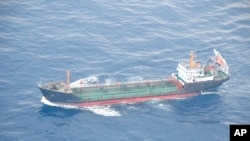China asserted Monday that it "strictly" implements U.N. sanctions on North Korea, reacting to a letter from the Group of Seven, European Union and others that urged Beijing to stop Pyongyang from evading the measures by using Chinese waters.
The letter sent Friday expressed concern about "the continuing presence of multiple oil tankers ... that use your territorial waters in Sansha Bay as refuge to facilitate their trade of sanctioned petroleum products" to North Korea.
It was signed by G-7 members — the United States, Canada, France, Germany, Italy, Japan and Britain — plus Australia, New Zealand, South Korea and the EU and came ahead of a visit to North Korea this week by a high-level Chinese delegation.
"China has always been strictly implementing #UNSC resolutions and seriously fulfilling international obligations," China's U.N. mission spokesperson posted on Twitter in response to a Reuters report on the letter to China's U.N. envoy Zhang Jun.
"China urges relevant parties to fully implement UNSC resolutions on the DPRK, especially provisions related to resuming dialog, strengthening diplomatic efforts, and promoting political settlement," the spokesperson said.
North Korea, formally named Democratic People's Republic of Korea (DPRK), has been subject to U.N. sanctions since 2006 over its nuclear and ballistic missile programs. So-called six-party denuclearization talks — between North Korea, South Korea, China, the United States, Russia and Japan — stalled in 2009.
Talks between North Korean leader Kim Jong Un and then-U.S. President Donald Trump in 2018 and 2019 also failed. China and Russia have since pushed for U.N. sanctions to be eased for humanitarian purposes and to entice Pyongyang back to talks.
China said last year that the key to solving the issue of North Korea's ballistic missile and nuclear programs was in the United States' hands, urging Washington to show "more sincerity and flexibility" if it wants a breakthrough.
At a U.N. Security Council meeting earlier this month on Pyongyang's latest launch of an intercontinental ballistic missile, deputy U.S. Ambassador to the U.N. Jeffrey DeLaurentis said the United States was committed to diplomacy.
"Publicly and privately, and at senior levels, we have repeatedly urged the DPRK to engage in dialogue. We have made clear that we have no preconditions for engagement, and we are prepared to discuss any topic of concern to Pyongyang. The DPRK has not responded to our offers," he told the council.






